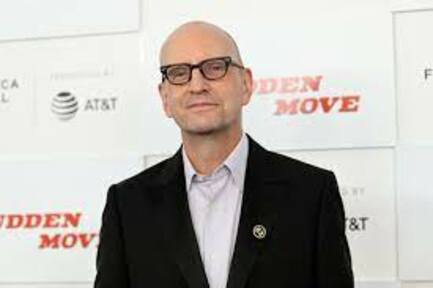On retirement – Brody in The New Yorker:
‘For a long time, Quentin Tarantino has spoken of his plan to walk away from filmmaking on his own terms—after making ten features, and by the age of sixty—while he still has plenty of vigor to devote to other kinds of work. He just reached sixty, and, having made his first nine films (he lumps the two “Kill Bill” installments together as one), he’s already at work on the tenth and, presumably, last, which is tentatively titled “The Movie Critic.” The movie-centric subject suggests a follow-up to his previous film, “Once Upon a Time . . . in Hollywood”; he says that it will be set in 1977, but denied rumors that it would be about the longtime New Yorker film critic Pauline Kael. (He says that the critic will be male.)’
(…)
‘The most noteworthy counterpart to Tarantino’s announcement is the ballyhooed retirement of Steven Soderbergh, who, in 2011, announced that he was leaving Hollywood, and, in 2013, when he actually left, explained that he could no longer endure studio interference in his work. Like Sirk, he was fed up with the industry—but unlike Sirk, whose movie career was almost entirely bound up with big studios in Germany and the U.S., Soderbergh began as an independent filmmaker and thereby knew a degree of artistic freedom that not only loomed as an ideal but remained an easily accessible possibility—all the more so inasmuch as Soderbergh is also an artisanal, hands-on filmmaker who, since 2000, has been the director of photography on all his fiction features and, from the start of his career, in 1989, the editor of most. All Soderbergh needed to do was find an alternative movie economy, in order to move ahead as a director by going back as an independent (of sorts), and he found it—with television and streaming services. Soon after retiring from Hollywood, he started work on a TV series (in the event, “The Knick”); when he made “Unsane” (shot on an iPhone) and “Logan Lucky,” he produced them on his own; and his features “High Flying Bird” (also an iPhone movie) and “Kimi” were backed by Netflix and HBO Max, respectively. Yet his prolific retirement is also, in its essence, a sort of failure: at the same time as he declared his desperation to be free of studio strictures, he also expressed the desire to search for a new aesthetic essence of movies, and spoke, in 2013, of his frustration with “the tyranny of narrative.” He said, “I’m convinced there’s a new grammar out there somewhere,” and added, “If I’m going to solve this issue, it means annihilating everything that came before and starting from scratch. That means I have to go away, and I don’t know how long it’s going to take.” In an odd way, his extensive career since then, which has included some excellent films, hasn’t in any way innovated as profoundly as he intended. He continued his search for the new grammar but, in fact, didn’t jettison everything he knew—he has indeed moved ahead, incrementally, but hasn’t gone back to zero to start over.’
(…)
‘Tarantino’s films have something of a Hitchcockian grandeur; for him, movies are an event, whereas for Soderbergh, they’re an activity. Tarantino’s “Reservoir Dogs” came out in 1992, and he’s now preparing his tenth feature. The prolific Soderbergh, whose début fiction feature, “Sex, Lies, and Videotape,” premièred in 1989, reached his tenth dramatic feature by 2001, and has made twenty-two more of them since then—nearly one a year, in addition to a handful of documentaries and two seasons of the TV series “The Knick,” for which he directed all twenty episodes. If push came to shove, Soderbergh, stuck in one room, would video that room, and himself, with his phone and find a way to edit it into something; Tarantino wouldn’t film at all, but would write.’
(…)
‘Tarantino, at his best, creates iconography, moments that are images of memory itself—and, at his worst, obtrusiveness, things remembered involuntarily with annoyance. Soderbergh’s films take power as their subject; Tarantino’s are objects and embodiments of power. Soderbergh’s films have the elusive curl of question marks; Tarantino’s are exclamations, and who can blame him, with his distinctively vehement voice (in person and cinematically), for not wanting to become an old man who yells?’
(…)
‘Soderbergh escaped from Hollywood in order to evade its limitations; Tarantino’s planned escape seems meant to evade his own. The very fear of risk, the sense of pride and even vanity with which he protects his name, could stand as the ultimate form of self-criticism. Perhaps the very title and subject of his planned final film suggests that it might be the most personal of all his movies.’
Read the article here.
Who wants to become an old man who yells? To direct your own exit is above all a shining example of the desire to control.
Based on his book on movies in the seventies and my interview with him in Amsterdam in April I would say that Tarantino is not interested in autobiography. To him all the autobiography he can endure is the movies he saw in his youth with his mother, his stepfather, and several friends of his mother.
He is a true escape-artist, and he knows that violence can equal meaning.
As to Soderbergh, this article reminded me that it’s a long time since I saw my last Soderbergh. It might be time to go back to Soderbergh.
